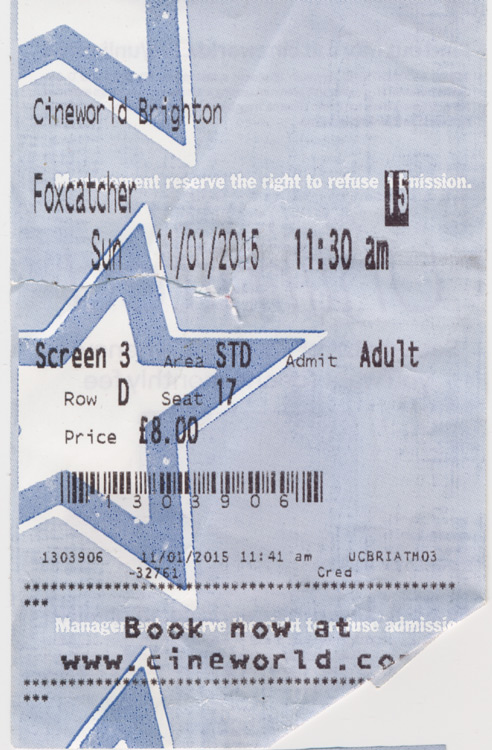Foxcatcher

It’s time to get cynical about nihilism!
I didn’t want to say much about the simultaneously dull and ugly Foxcatcher. It’s like wrestling with a pig: you get dirty, and the pig retains his holier-than-thou attitude. Foxcatcher is the worst film of the year for the hat-trick of its being unpleasant and poorly made, and one should leave it that. Nevertheless, one thing of interest, which accidentally leads to a second, which accidentally leads to a third, inasmuch as anything that takes two weeks to cough out is an accident.

First, the first: nihilism, etc., which I’ve talked about to the point where it’s as boring as…The Disappearance of Eleanor Rigby. Come on, my harping on about The Nihilist isn’t as bad as…using ellipses. It’s stupid enough that something dark is treated as inherently insightful. People Are Bad. Let me stroke my beard and think about how that makes all the ordinary shitty things I did just today seem justified. But here the teensiest of slight insights:
Foxcatcher wants to be a TV movie of its set era, like The Deliberate Stranger and Fatal Vision. Or maybe I just wanted it to be, so I would be watching something well-made, acted and entertaining. But besides being much better, these teleplays very importantly offer the murder at the beginning. This matters, since ending with the murder as Foxcatcher does makes the act the conclusion. Just as our lives are result of us doing or not doing stuff which totally proves we should have done or not done said stuff, the ending of a movie is retroactively the conclusion. Ending at the murder means what mattered were the motives of yet another boring sociopath. I think we’ll call this the Terrorists Are People Too genre.
The motives? Well, I’m glad you asked why I asked that rhetorical question. As much I hated The Babadook, and it was terrible, Foxcatcher is worse. It was longer, yes, but also it was longer. Foxcatcher along with the new trend of Sweater Dramas like The Killing (either) and Broadchurch take on the additional ballast that something long is inherently insightful. Let me give you an example, though the film is rife with them.
It begins with Mr. Tatum as the poor olympic athlete giving a lecture to half-full auditorium of bored children. He then gets a meager check where the woman mistakes him for his more famous brother. He then goes to his depressing apartment. Get it, the film, very, very, very slowly seems to say, he’s down on his luck!
G
E
T
I
T
? is a bit more representational.
A well made film can convey this beat in a moment, a scene, a line or even a look. Instead, the first twenty minutes are a student film about ‘being bummed’. This is the new Sweater Aesthetic, so named as the only thing people can remember about Mw. Sofie Gråbøl’s character. Got a cliché? Don’t rethink it, or attempt to address with concision or wit. Just stretch it the fuck out, and people will flock to praise you. What would be cliché or downright offensive in any other film (including I’m Seeking My Mother’s Approval!, You Loved Your Horses More Than Me! and Gay People Are Scary!), become super insightful and extra super real when elongated. In fact, someone who shall remain nameless went on and on and on about going on and on here. And speaking of stretching it the fuck out…
Look, Mr. Steve Carrell’s performance is okay, I guess, and I like the guy fine. He was in the good version of The Office. But it comes in a year of excellent unrecognized performances like Ms. Julianne Moore’s work in Map of the Stars, anything Mr. Jake Gyllenhaal did, Mr. Seymour Hofmann’s last, and probably best, performance, anything Mr. Tom Hardy will ever do, and Mr. Bill Hader’s stunning turn in The Skeleton Twins. Mr. Hader bears mentioning here because not only is he from a similar background as Mr. Carrell, but Mr. Hader plays what could and should have been a caricature as a real person, and like all great film performances, you can’t figure out how.
Mr. Carrell is serviceable, but never rises above this feeling that you’re watching a copy. Performance is a lot like cinematography: you’re trying to create the illusion of depth. Cinematographers do this with framing, focal lengths, and color palates, or used to anyway, until the age of ‘let’s slap a 50mm ƒ1.8 on our RedEye and turn the ‘film look’ up to 97!’ For acting, and how the fuck should I know, it’s finding the human in there. A pro like Mr. Mark Ruffalo generates, for example, the film’s only engaging scene, as he struggles to say on camera that his coaching work was in fact the doing of Mr. Carrell’s character. I don’t know how actors do it, but I know when they do, and when it all of its elements combine, Foxcatcher is just 3D.
Nope. I’m not taking it back.
Thinking on this more, I’m not convinced that this film’s ugly side is not what dooms it for me. Nihilism is lazy, sure, but then there’s Nightcrawler, fifty times the film at half the length. Mr. Gyllenhaal plays a character who is arguably much, much nastier than Mr. Carrell’s, and yet exists in one of the best films of the year. Nightcrawler, however, besides having more than a passing insight about what drives ambition, commits the unpardonable sin of being entertaining.
I suspect that this is the problem all along. We’ve always been suspicious of pleasure; the fact that comedy, by the hardest gimmick to get right, is, despite the sweat and terror that goes into it, not be taken seriously. Film is about creating a feeling, and in that sense Foxcatcher is a success, at least at being beets. I didn’t like it – it must be good for me. This type of film is Hobbesfreude taken to the extreme, content and form. The therapists are always asking us, would you rather be right or happy, but what happens if you just want to be right about not being happy?
-$14.00
The Lonely Comments Section

 [logo]
[logo]

